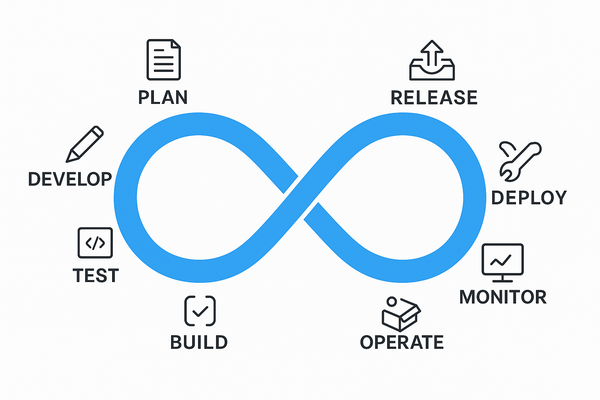DevOps — it’s more than a buzzword. It promises faster delivery, improved collaboration, better-quality software, and reduced time to market. But for many teams, DevOps remains a lofty goal rather than a practical reality.
If you’ve ever felt overwhelmed by the countless tools, frameworks, and shifting responsibilities, you’re not alone. The challenge isn’t about lacking resources; it’s about navigating complexity and driving real, sustainable change.
Instead, start small with a well-defined pilot project that acts as a proving ground.
How to Do It:
- Pick a low-risk application — something non-critical where failure won’t be catastrophic.
- Assemble a cross-functional team — include devs, ops, QA, and product owners to break silos early.
- Target a specific pain point — slow deployment? Poor feedback loops? Focus on solving one problem with DevOps principles.
Tip: A successful pilot builds internal case studies, showing real benefits and creating champions for broader adoption.
Automate, Automate, Automate — But Do It Smartly
At its core, DevOps is about automation—but not blind automation. The goal is to free your teams from repetitive, error-prone tasks so they can focus on innovation and delivery.
Key Areas to Automate:
- Version Control Everything
Not just code—put infrastructure, config files, and test scripts in Git. IaC (Infrastructure as Code) is non-negotiable. - Build CI/CD Pipelines
Implement Continuous Integration and Continuous Delivery using tools like Jenkins, GitLab CI/CD, GitHub Actions, or Azure DevOps. - Automate Testing
Include unit, integration, and performance tests in your pipeline to catch bugs early. - Automate Infrastructure Provisioning
Use tools like Terraform, Ansible, or Pulumi to provision environments consistently and reproducibly.
Start small: Automate the most time-consuming or failure-prone manual processes first.
Foster a Culture of Collaboration and Shared Responsibility
DevOps isn’t just about tools—it’s a cultural transformation. The hardest part of DevOps is often human, not technical.
Culture Hacks for DevOps Success:
- Blameless Postmortems
Focus on learning, not blaming. Encourage transparency after incidents. - Shared Goals & Metrics
Developers and Ops should align around KPIs like uptime, lead time, and incident recovery rate. - Cross-Training
Let developers understand infra, and ops understand code. Hold regular internal workshops and pair programming sessions. - Feedback Loops
Build systems where teams get real-time feedback on how code performs in production.
DevOps thrives when teams own the entire lifecycle—from development to deployment to operations.
Prioritize Observability: Monitoring and Logging from Day One
You can’t fix what you can’t see. Without visibility, DevOps collapses into guesswork. Robust monitoring and logging are essential for healthy operations.
Observability Essentials:
- Centralized Logging
Use tools like the ELK Stack, Splunk, or Datadog to aggregate logs for fast troubleshooting. - Monitoring Key Metrics
Watch CPU, memory, disk I/O, application latency, and user behavior. - Set Up Alerts
Configure smart alerts to detect anomalies before users do. - Distributed Tracing
Especially in microservices, tracing tools like Jaeger, Zipkin, or OpenTelemetry help track issues across services.
From Day 1, embed observability into your workflows to shift from reactive firefighting to proactive problem-solving.
DevOps Is a Journey, Not a Destination
DevOps isn’t a one-and-done transformation. It’s a continuous improvement mindset. It requires:
- Technical excellence
- Collaborative culture
- Data-driven decision-making
- A willingness to adapt
By starting small, automating smartly, fostering collaboration, and prioritizing observability, your organization can move beyond the hype and start realizing DevOps’ full potential—delivering high-quality software quickly, safely, and at scale.
What’s Your DevOps Challenge?
Are you struggling with automation, culture, tooling, or something else?
Leave a comment below — let’s make DevOps simpler, together.
Next Steps
- Follow our tutorials
- Explore more DevOps engineer career guides
- Subscribe to InsightClouds for weekly updates
- Subscribe our DevOps youtube channel

Leave a Reply